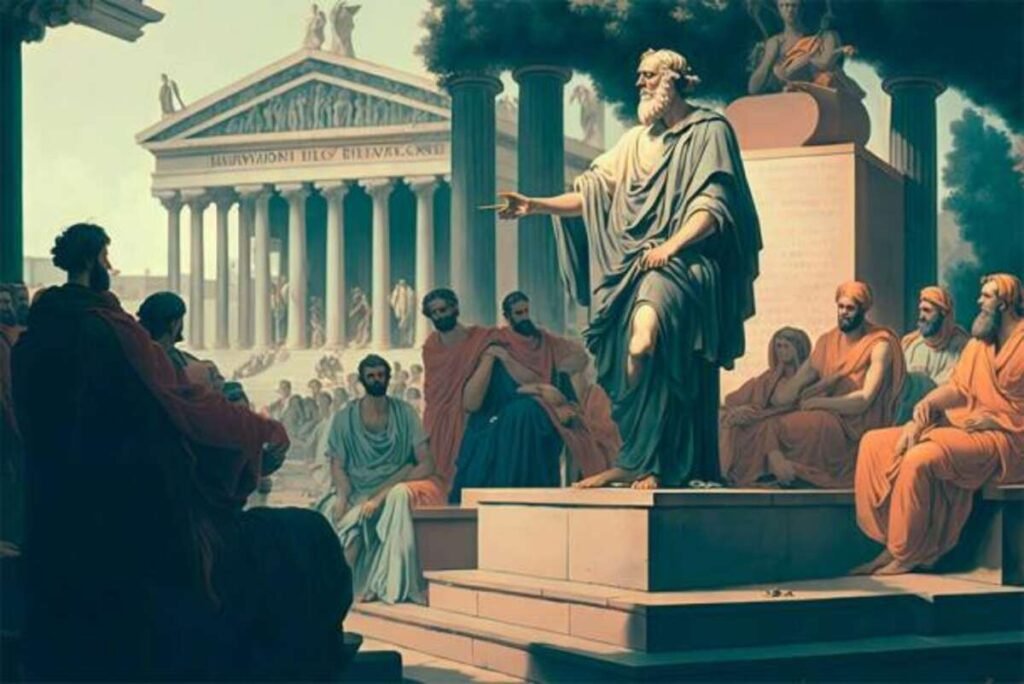On the first Sunday of May every year, the local people of Canton of Glarus, Canton of Schwyz, and Canton of Graubünden, in east-central Switzerland, gather around in a circle and hold one of the last open-air democratic assemblies, Landsgemeinde. There are no ballots, no booths, just the citizens voting to elect their government and courts and to decide about financial matters and laws by raising their hands in public.
Modern democracy is often associated with polling stations, secret ballots, and voter ID. But centuries ago, democracy was celebrated in a very different way, which still survives today, but only symbolically, known as Landsgemeinde.
Lets have a look at how Landsgemeinde has shaped modern democracy.
What Is Landsgemeinde?
Landsgemeinde means “community of the land.” It is a centuries-old Swiss practice of direct democracy, dating back to the 13th century. During Landsgemeinde, instead of casting votes through ballots, citizens gather around once a year, on the first Sunday of May, and vote on laws, and taxation policies, and elect officials, by raising their hands. It is considered one of the oldest surviving democratic traditions in the world today.

The Landsgemeinde originated at a time in Switzerland when the small communities and local Swiss peasants demanded autonomy from feudal lords. It began in 1231 when citizens gathered together to meet and decide collectively who they wanted as their ruler and what laws and policies they would agree to. These open-air assemblies were considered a radical idea at that time, symbolizing that the political power belonged not to the nobles or the clergy, but to the common people.
From Landsgemeinde to Representative Democracy
Though Landsgemeinde is not where the early democracy and voting began, it still stands as one of the oldest practices to elect officials. Direct Democracy originated in Ancient Athens in the 5th century BCE, where the citizens voted on matters of significance in public assemblies, a practice which was later followed in colonial America allowing residents to decide on local issues in town meetings.

However, as the population started to grow and societies became complex, it was difficult to manage direct democracy and gather a large number of people in a local assembly, which gave birth to the idea of representative democracy. In a representative democracy, local representatives were given the power to elect officials on behalf of the citizens.
Other than Landsgemeinde, let’s find out some of the key milestones in the evolution of voting.
Secret Ballots were first introduced in Australia during the 1850s, enabling people to vote by casting secret ballots, to reduce manipulation and coercion meanwhile preserving voter’s privacy.
Universal Suffrage was another milestone in voting history in which many democracies including Switzerland gradually expanded their voting rights to include women and minorities in the 1970s. In the northeastern canton of Appenzell Innerrhoden, women were allowed to cast a vote in Landsgemeinde only after the ruling of the Swiss court in 1991.
Digital Voting, another breakthrough in the history of voting, was introduced first by Estonia. In the early 2000s, Estonia began national digital voting, a practice that was quickly adopted by several Western states.

Today, digital voting technology plays a significant role in increasing the participation of the public during national and local elections.
Why Landsgemeinde Still Matters?
Despite the limitations such as lack of women participation, lack of privacy, and subjective vote counts, Landsgemeinde remains highly significant. It reminds us not only about the roots of democracy and voting but also about the significance of collective voting, swift accountability, and active participation of civil society in decision-making.
At a time when there is a decline of public trust in state institutions and lack of political engagement of citizens, the visual of citizens standing in open-air in public and raising their hands to decide collectively, is a stark reminder of transparency and civic responsibility. It also emphasizes that the simple action of a hand-raising vote is based on community trust and public legitimacy.
Although Landsgemeinde may appear an outdated Swiss tradition, it encapsulates some of the most essential values of democracy. The systems of voting might have changed today, due to technological evolution, but the core idea must remain, that people should have a say in how they are governed and who they want as their ruler.
Javaria Khalid is a writer and researcher, who specializes in Pakistan's Foreign Policy Analysis, transatlantic geopolitics, and Pakistan’s relations with the European countries and the EU. She can be reached at javariakhalid011@outlook.com






